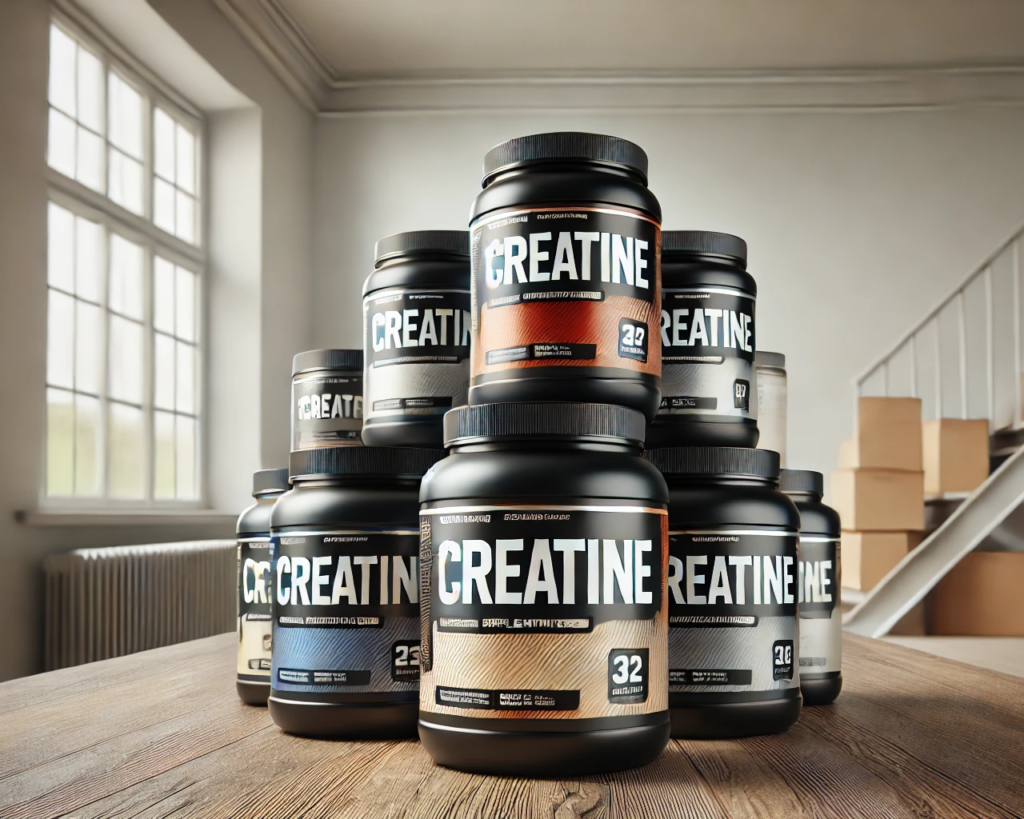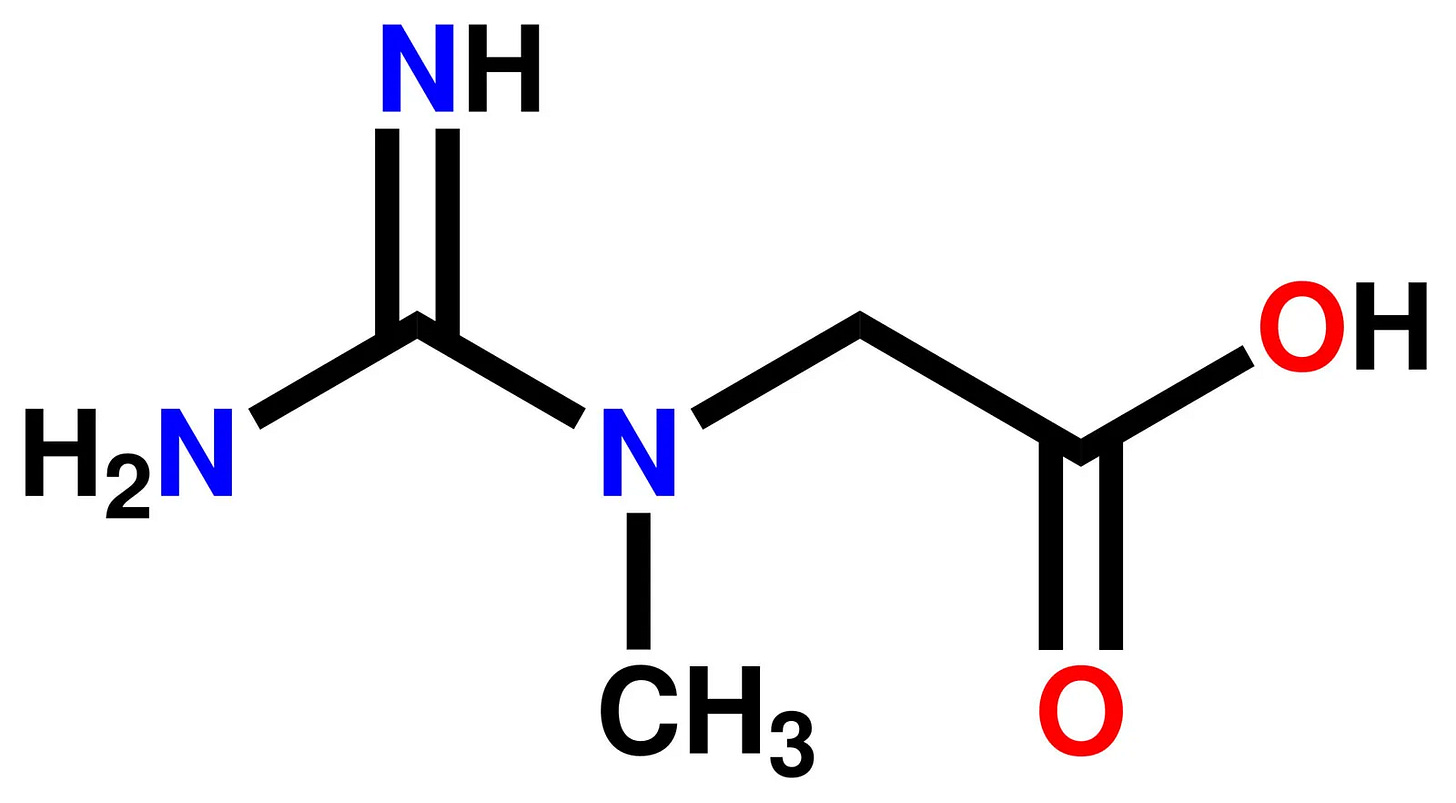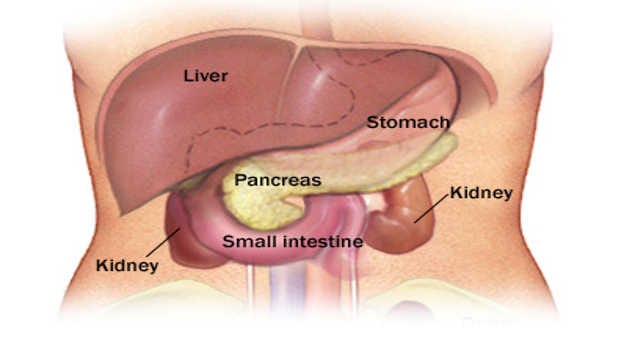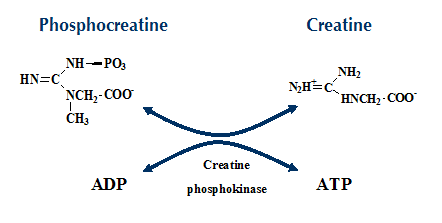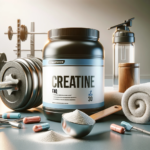
Creatine is not just a powerhouse for boosting strength; it also supports muscle recovery and offers significant neurocognitive benefits. As one of the most extensively studied supplements, creatine has a well-established safety and efficacy profile. This article delves into the science behind creatine, its benefits, safety, and the reasons why it should be a top-tier supplement in your regimen.
🧬Physiology of Creatine
Creatine is an Aminoacid
While technically speaking creatine is classified as an amino acid based on its chemical structure (Be honest, you didn’t know this), creatine doesn’t function as a typical amino acid in the traditional sense because:
- It does not get incorporated into proteins like other amino acids do, and
- It is not categorized in the same way (essential, conditionally essential, and non-essential amino acids)
Instead, creatine is synthesized naturally in the body – primarily in the liver, kidneys, and pancreas, and is then transported into muscle cells and neural tissue where it helps regenerate ATP – the primary energy source for cells. Creatine is also an osmotic agent and therefore, it pulls water into cells – it turns out that a well-hydrated cell with plenty of energy works better than a dehydrated cell with less energy.
☝🏽🤓Technically speaking, creatine is actually stored in cells as phosphocreatine, and it is in this form that it contributes to the rapid regeneration of ATP by donating its phosphate group to depleted ADP molecules:
This process of creatine-mediated ATP regeneration is what allows muscle cells to maintain a readily-available energy supply that in turn leads to improved strength and performance during short bursts of intense exercise.
🩸🧪Interference with Lab Values
Creatine supplementation can lead to an artificial increase in certain kidney bloodwork markers. This occurs because around 1% to 2% of creatine in our bodies is continuously and naturally degraded into creatinine, a blood marker that physicians use as a surrogate for kidney function. Taking creatine supplements artificially increases the amount of creatinine in our blood but does not affect kidney function and is completely safe.
☑️What are the Top Benefits of Creatine?
💪🏽Benefits of Creatine – Strength
Creatine has been used a supplement for decades. The effects on strength-based exercise and performance have been well documented in over 2000 scientific studies since the 1970s.
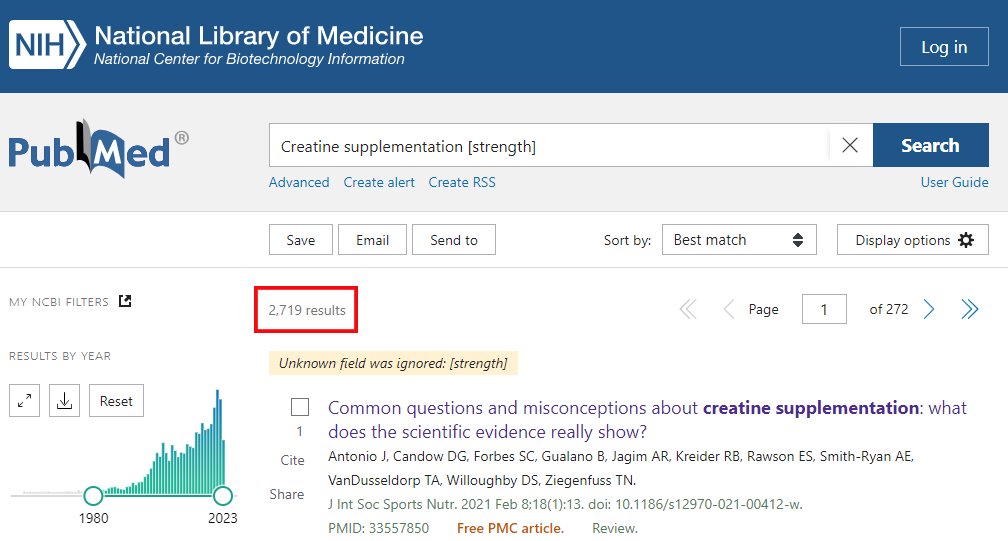
Numerous properly controlled research studies have documented improvements in performance and muscle strength during short-duration, high-intensity exercises including bench press, leg press, biceps curls, leg extensions, jump squats, and endurance.
For example, two systematic meta-analyses – of about 60 individual studies each, have demonstrated that creatine supplementation is effective in increasing both lower limb, and upper limb performance. And independent studies have confirmed that some of these affects can be observed in as little of two weeks.
Here are a couple of figures that showcase data from some of these individual primary research studies:
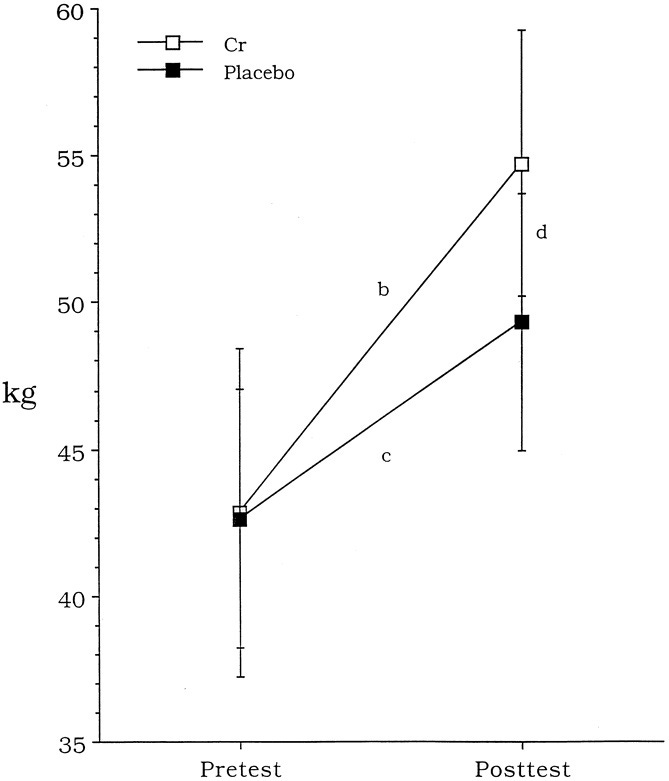
Muscular strength (1RM) is presented for Creatine and Placebo. There were no significant (P > 0.01) differences between the groups at pretest. There was a significant (P < 0.01) increase in muscular strength for both groups (b and c) from pretest to post-test. At post-test, Cr muscular strength was significantly (P < 0.01) greater than Placebo muscular strength (d).
Effects of oral creatine supplementation on muscular strength and body composition; Medicine & Science in Sports & Exercise32(3):654-658, March 2000
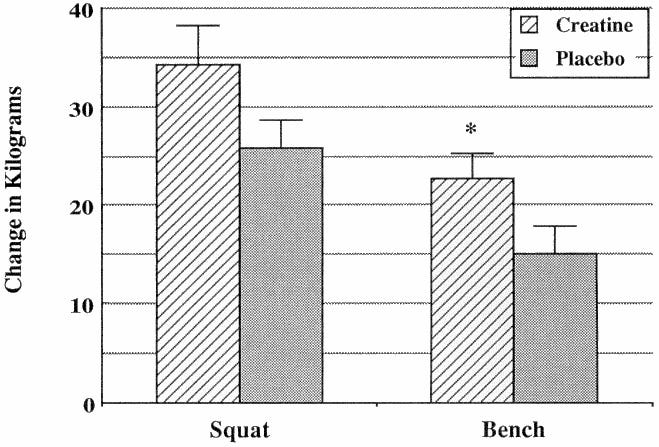
Delta changes in one-repetition maximum squat and bench press after 12 wk of heavy resistance training in creatine and placebo subjects. * P ≤ 0.05 from corresponding change in the placebo group. Values are mean ± SE.
Performance and muscle fiber adaptations to creatine supplementation and heavy resistance training. Medicine & Science in Sports & Exercise31(8):1147-1156, August 1999.
🏋🏽Benefits of Creatine – Muscle Recovery
The molecular mechanisms through which creatine enhances muscle recovery are not entirely understood, but several reports suggest that the main potential mechanisms may include restoration of energy substrates, facilitation of cellular hydration, reduction of inflammation, and support of muscle protein synthesis:
Restoration of energy substrates: At a subcellular level, the mechanisms in charge of muscle repair, decreasing inflammation, and accelerating the overall healing process can be broken down into its functional components: chemical reactions. In general terms, chemical reactions require energy in the form of ATP to efficiently proceed to completion and hence, creatine-dependent ATP restoration is thought to play a major role in muscle recovery.
Cellular hydration: Creatine-dependent muscle hydration aids in recovery through several interconnected mechanisms:
- Cellular Health: Well-hydrated muscle cells are better equipped to repair damage, remove waste products, and transport nutrients essential for recovery.
- Toxin Clearance: Adequate hydration supports the efficient removal of metabolic waste and toxins that accumulate during intense exercise.
- Nutrient Transport: Hydrated muscle cells facilitate the transport of nutrients, such as amino acids and glucose, which are essential for muscle repair and replenishment of energy stores.
- Muscle Protein Synthesis: Hydrated cells create a favorable environment for muscle protein synthesis, the process by which muscle fibers repair and grow. .
- Optimized Cell Environment: Hydrated cells maintain an optimal cellular environment that supports enzymatic reactions and cellular processes necessary for tissue repair.
Reduction of inflammation: The mechanisms through which creatine reduces inflammation are not fully elucidated, but several potential pathways have been suggested:
- Antioxidant Properties: Creatine has been proposed to possess antioxidant properties – which could help counteract oxidative stress and inflammation caused by intense exercise.
- Cellular Signaling: Creatine’s impact on cellular signaling pathways might contribute to inflammation reduction. It could modulate signaling molecules involved in inflammation and immune responses, helping to regulate the body’s inflammatory processes.
- Neuroprotective Effects: Some studies indicate that creatine’s neuroprotective properties might indirectly influence inflammation.
- Energy Supply: Creatine’s role in replenishing ATP, might indirectly impact inflammation. Adequate energy availability could help maintain cellular integrity and minimize inflammation associated with energy depletion.
Muscle Protein Synthesis: Creatine may influence muscle protein synthesis, the process by which muscle fibers repair and grow. This could contribute to faster recovery times and greater muscle mass over time.
Creatine may enhance muscle protein synthesis through the following mechanisms:
- Energy Supply: Creatine’s role in regenerating ATP provides a readily available energy source for muscle cells. This increased energy availability supports the energy-intensive process of protein synthesis.
- Cellular Hydration: Creatine-driven cellular hydration creates an optimal environment for protein synthesis. Well-hydrated cells have improved nutrient transport and enzymatic activity, facilitating the synthesis of new proteins.
- Cellular Signaling: Creatine might influence cellular signaling pathways involved in protein synthesis. It could modulate signaling molecules like mTOR (mammalian target of rapamycin) that regulate protein synthesis in response to exercise and nutrient availability.
- Amino Acid Uptake: Creatine may enhance the uptake of amino acids, the building blocks of proteins, into muscle cells. This increased availability of amino acids can directly contribute to the process of muscle protein synthesis.
- Gene Expression: Some studies suggest that creatine supplementation might influence gene expression related to muscle growth and protein synthesis, potentially leading to an upregulation of protein synthesis-related genes.
⚖️Benefits of Creatine – Lean Body Mass
At the core of creatine’s impact is its ability to influence muscle protein synthesis. This process is responsible not only for repairing but also building muscle fibers. By providing the energy necessary for muscle recovery and growth, creatine sets the stage for an increase in muscle mass over time.
A number of studies have showcased the promising effects of creatine on body composition highlighting the fact that creatine helps tip the scales in favor of fat-free mass gains even among elderly populations. By bolstering muscle protein synthesis and promoting muscle growth, creatine favors lean body mass development because larger muscles require more energy to move and maintain, and therefore tip the scale even further towards a favorable caloric balance and metabolic state.
The following graphs from peer-reviewed research studies illustrate some of the effects of creatine on lead body mass composition:
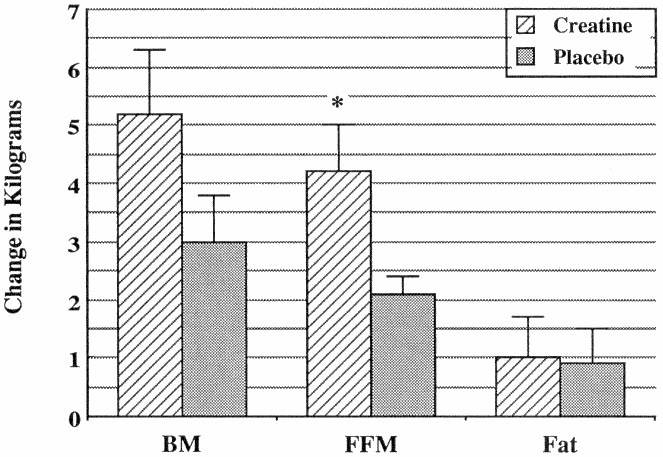
Delta changes in body mass (BM), fat-free mass (FFM), and fat mass after 12 wk of heavy resistance training in creatine and placebo subjects. * P ≤ 0.05 from corresponding change in the placebo group. Values are mean ± SE.
Performance and muscle fiber adaptations to creatine supplementation and heavy resistance training. Medicine & Science in Sports & Exercise31(8):1147-1156, August 1999.
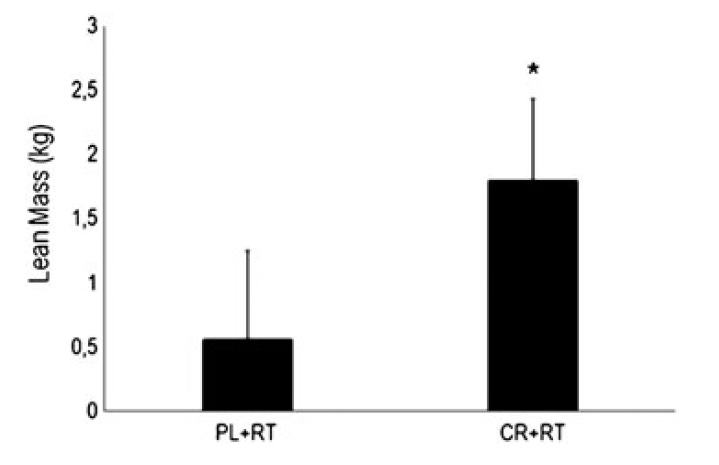
Effects of resistance training combined or not with creatine supplementation on lean mass in the elderly. CR + RT = creatine + resistance training; PL + RT = placebo + resistance training. *P<0.05. Data are expressed as delta score ± standard deviation.
Impact of creatine supplementation in combination with resistance training on lean mass in the elderly. Journal of Cachexia, Sarcopenia and Muscle2016;7: 413–421
🧠Benefits of Creatine – Neurocognitive Enhancement
While creatine is often associated with physical performance, one of the more interesting aspects of it is that its impact extends beyond the realm of muscles. An emerging area of research is shedding light on the remarkable neurocognitive effects of creatine:
Cognitive Energy Reservoir: From an energy perspective, the brain is very metabolically demanding. Just as creatine provides a rapid energy source for muscles, it appears to play a similar role in the brain. The brain’s energy demands are high, and creatine may serve as a cognitive energy reservoir, ensuring a stable and readily available supply of ATP to fuel mental processes.
Enhanced Cognitive Function: Several studies suggest that creatine supplementation could enhance various aspects of cognitive function. Improved memory, attention, and decision-making have been reported in individuals who incorporated creatine into their regimen. This cognitive boost might stem from creatine’s ability to support brain energy metabolism, ensuring optimal brain function even during mentally demanding tasks. Meta-Analysis here: Effects of creatine supplementation on cognitive function of healthy individuals: A systematic review of randomized controlled trials
Neuroprotection and Neurological Health: Creatine’s potential as a neuroprotective agent has garnered significant attention. It may help shield brain cells from oxidative stress and inflammation, which are implicated in neurodegenerative conditions like Alzheimer’s and Parkinson’s diseases. While more research is needed, creatine’s neuroprotective properties hold promise for promoting long-term brain health. More info here: Effects of Creatine Supplementation on Brain Function and Health
Mood Enhancement: Some studies suggest that creatine could positively impact mood and mental well-being. Individuals undergoing creatine supplementation have reported reductions in symptoms of depression and anxiety. These effects might be attributed to the supplement’s role in supporting neurotransmitter systems involved in mood regulation. More information here: Creatine for the Treatment of Depression.
🦺Benefits of Creatine – Safety
One of the standout features of creatine is its well-established safety profile. Decades of research have consistently shown that creatine supplementation is not only effective but also remarkably safe. The International Society of Sports Nutrition (ISSN) and other authoritative bodies have rigorously assessed its safety and efficacy, providing valuable insights and guidelines for its use.
No Harmful Effects on Organs: Contrary to some misconceptions, creatine supplementation does not adversely affect organ health. Studies have shown no negative impact on the liver, kidneys, or other vital organs even with long-term use.
Kidney and Renal Function: Concerns regarding kidney health have been thoroughly investigated, and research consistently supports the safety of creatine supplementation, even for individuals with pre-existing kidney conditions.
Digestive Health: Creatine’s effects on digestion are generally benign. Gastrointestinal discomfort is rare and often mild. Opting for high-quality creatine monohydrate and staying hydrated can minimize any potential digestive issues.
Interaction with Medications: For those on medication, it’s always wise to consult a healthcare professional before starting any supplement regimen, including creatine. While creatine is generally safe, it’s essential to ensure compatibility with existing medications and individual health conditions.
💊Dosing
The advice on how much creatine to take varies. Researchers have looked at different amounts of creatine ranging from 0.07 grams per kilogram of body weight per day to 5 grams per day, and have found good results for muscle growth with resistance training. However, the amount taken doesn’t seem to matter a whole lot.
Some experts suggest a maintenance dose of 0.03 grams per kilogram per day for about 4 to 6 weeks. But different studies used maintenance doses for different times, like 28 days to 10 weeks.
Many creatine supplements have around 4 to 5 grams of creatine in each dose. Some people do a “loading dose” of creatine before switching to a daily dose. You might hear about taking 20 to 25 grams per day, split into 4 doses, for about 5 to 7 days. However, even the recommended loading doses can be different.
The International Society of Sports Nutrition suggests a loading dose of about 0.3 grams per kilogram per day for at least 3 days, but there isn’t a clear agreement on the best way to do this in terms of amount, how often, or how long.
Disclaimer: This content is provided for educational purposes only and should not be construed as medical advice. Always consult with your primary care physician (PCP) or a qualified healthcare professional before making any changes to your lifestyle, diet, or exercise routine. The information presented in this article is not intended to diagnose, treat, cure, or prevent any disease. Individual results may vary. The author and publisher of this article are not responsible for any adverse effects or consequences resulting from the use or application of the information provided. Please use your own discretion and judgment when implementing any suggestions or recommendations.

